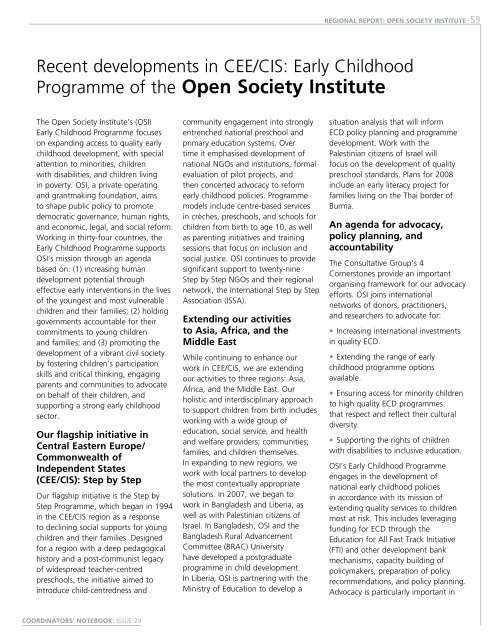A global call to action for early childhood
A global call to action for early childhood
A global call to action for early childhood
Create successful ePaper yourself
Turn your PDF publications into a flip-book with our unique Google optimized e-Paper software.
REGIONAL REPORT: Open Society Institute<br />
59<br />
Recent developments in CEE/CIS: Early Childhood<br />
Programme of the Open Society Institute<br />
The Open Society Institute’s (OSI)<br />
Early Childhood Programme focuses<br />
on expanding access <strong>to</strong> quality <strong>early</strong><br />
<strong>childhood</strong> development, with special<br />
attention <strong>to</strong> minorities, children<br />
with disabilities, and children living<br />
in poverty. OSI, a private operating<br />
and grantmaking foundation, aims<br />
<strong>to</strong> shape public policy <strong>to</strong> promote<br />
democratic governance, human rights,<br />
and economic, legal, and social re<strong>for</strong>m.<br />
Working in thirty-four countries, the<br />
Early Childhood Programme supports<br />
OSI’s mission through an agenda<br />
based on: (1) increasing human<br />
development potential through<br />
effective <strong>early</strong> interventions in the lives<br />
of the youngest and most vulnerable<br />
children and their families; (2) holding<br />
governments accountable <strong>for</strong> their<br />
commitments <strong>to</strong> young children<br />
and families; and (3) promoting the<br />
development of a vibrant civil society<br />
by fostering children’s participation<br />
skills and critical thinking, engaging<br />
parents and communities <strong>to</strong> advocate<br />
on behalf of their children, and<br />
supporting a strong <strong>early</strong> <strong>childhood</strong><br />
sec<strong>to</strong>r.<br />
Our flagship initiative in<br />
Central Eastern Europe/<br />
Commonwealth of<br />
Independent States<br />
(CEE/CIS): Step by Step<br />
Our flagship initiative is the Step by<br />
Step Programme, which began in 1994<br />
in the CEE/CIS region as a response<br />
<strong>to</strong> declining social supports <strong>for</strong> young<br />
children and their families. Designed<br />
<strong>for</strong> a region with a deep pedagogical<br />
his<strong>to</strong>ry and a post-communist legacy<br />
of widespread teacher-centred<br />
preschools, the initiative aimed <strong>to</strong><br />
introduce child-centredness and<br />
community engagement in<strong>to</strong> strongly<br />
entrenched national preschool and<br />
primary education systems. Over<br />
time it emphasised development of<br />
national NGOs and institutions, <strong>for</strong>mal<br />
evaluation of pilot projects, and<br />
then concerted advocacy <strong>to</strong> re<strong>for</strong>m<br />
<strong>early</strong> <strong>childhood</strong> policies. Programme<br />
models include centre-based services<br />
in crèches, preschools, and schools <strong>for</strong><br />
children from birth <strong>to</strong> age 10, as well<br />
as parenting initiatives and training<br />
sessions that focus on inclusion and<br />
social justice. OSI continues <strong>to</strong> provide<br />
significant support <strong>to</strong> twenty-nine<br />
Step by Step NGOs and their regional<br />
network, the International Step by Step<br />
Association (ISSA).<br />
Extending our activities<br />
<strong>to</strong> Asia, Africa, and the<br />
Middle East<br />
While continuing <strong>to</strong> enhance our<br />
work in CEE/CIS, we are extending<br />
our activities <strong>to</strong> three regions: Asia,<br />
Africa, and the Middle East. Our<br />
holistic and interdisciplinary approach<br />
<strong>to</strong> support children from birth includes<br />
working with a wide group of<br />
education, social service, and health<br />
and welfare providers; communities;<br />
families; and children themselves.<br />
In expanding <strong>to</strong> new regions, we<br />
work with local partners <strong>to</strong> develop<br />
the most contextually appropriate<br />
solutions. In 2007, we began <strong>to</strong><br />
work in Bangladesh and Liberia, as<br />
well as with Palestinian citizens of<br />
Israel. In Bangladesh, OSI and the<br />
Bangladesh Rural Advancement<br />
Committee (BRAC) University<br />
have developed a postgraduate<br />
programme in child development.<br />
In Liberia, OSI is partnering with the<br />
Ministry of Education <strong>to</strong> develop a<br />
situation analysis that will in<strong>for</strong>m<br />
ECD policy planning and programme<br />
development. Work with the<br />
Palestinian citizens of Israel will<br />
focus on the development of quality<br />
preschool standards. Plans <strong>for</strong> 2008<br />
include an <strong>early</strong> literacy project <strong>for</strong><br />
families living on the Thai border of<br />
Burma.<br />
An agenda <strong>for</strong> advocacy,<br />
policy planning, and<br />
accountability<br />
The Consultative Group’s 4<br />
Corners<strong>to</strong>nes provide an important<br />
organising framework <strong>for</strong> our advocacy<br />
ef<strong>for</strong>ts. OSI joins international<br />
networks of donors, practitioners,<br />
and researchers <strong>to</strong> advocate <strong>for</strong>:<br />
• Increasing international investments<br />
in quality ECD.<br />
• Extending the range of <strong>early</strong><br />
<strong>childhood</strong> programme options<br />
available.<br />
• Ensuring access <strong>for</strong> minority children<br />
<strong>to</strong> high quality ECD programmes<br />
that respect and reflect their cultural<br />
diversity.<br />
• Supporting the rights of children<br />
with disabilities <strong>to</strong> inclusive education.<br />
OSI’s Early Childhood Programme<br />
engages in the development of<br />
national <strong>early</strong> <strong>childhood</strong> policies<br />
in accordance with its mission of<br />
extending quality services <strong>to</strong> children<br />
most at risk. This includes leveraging<br />
funding <strong>for</strong> ECD through the<br />
Education <strong>for</strong> All Fast Track Initiative<br />
(FTI) and other development bank<br />
mechanisms, capacity building of<br />
policymakers, preparation of policy<br />
recommendations, and policy planning.<br />
Advocacy is particularly important in<br />
COORDINATORS’ NOTEBOOK: ISSUE 29
















